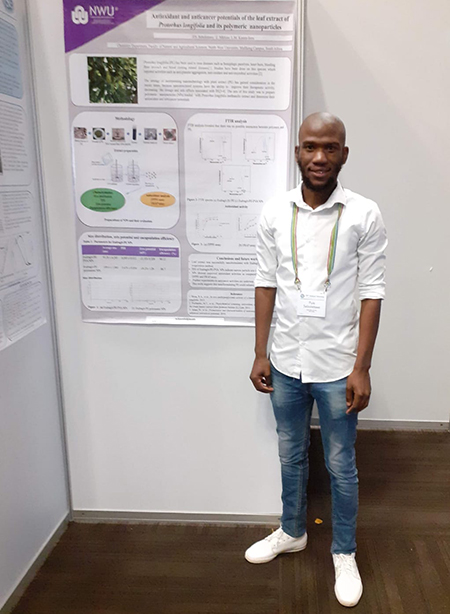A North-West University (NWU) graduate is bringing together age-old plant knowledge and the latest nanotechnology to make the most of medicinal plant extracts.
According to a United States National Nanotechnology Initiative, nanotechnology is currently revolutionising the technology and industrial sectors. These include information technology, homeland security, medicine, transportation, energy, food safety and environmental science, among many others.
MSc graduate Pule Silent Seboletswe recently conducted research into how nanotechnology can help in finding solutions for problems related to the use of natural products for therapeutic purposes.
His research study was titled “Nanoformulation of protorhus longifolia extracts and their biological evaluation”.
Protorhus longifolia, or red beech as it is more commonly known, is an evergreen tree in the mango family. It grows up to 15 metres and is found from Limpopo to the Eastern Cape.
“It is a South African medicinal plant that possesses interesting biologically active compounds and has been used traditionally to treat different types of ailments such as hemiplegic paralysis, heartburn, bleeding from the stomach, blood clotting-related diseases, heart water, dysentery and diarrhoea in cows,” says Pule.
He says the plant has biological activities such as antihyperglycaemic, antiplatelet aggregation, antihyperlipidaemic, antimicrobial and antioxidant properties.
The problem is that these benefits are not easily obtained because most existing plant extracts are poorly formulated.
Extracting maximum benefit
“The majority of plant extracts are crude preparations with highly hydrophobic phytoconstituents, which suffer from limitations such as poor solubility in aqueous media, poor lipid solubility, poor stability, toxicity, inappropriately larger molecular size, low absorption and bioavailability that ultimately result in poor biological activity or reduced efficacy," explains Dr Zimbili Mkhize, Pule’s master’s supervisor.
“It is for this reason that there is a need to lower the limitations associated with plant extracts. The evolving developments in nanotechnology may help in finding solutions for problems related to the use of natural products for therapeutic purposes,” Dr Mkhize adds.
According to Pule, nanostructured systems can potentiate the biological activities of plant extracts.
Thus, the purpose of his study was to screen for phytochemicals present in the Protorhus longifolia methanolic extract, using high-performance thin-layer chromatography (HPTLC), and to prepare polymeric nanoparticles of the extract using Eudragit-S100 to enhance its antioxidant and antimicrobial activities.
“The results obtained in this study showed that the nanoformulation of plant extracts is essential in enhancing their biological activities, which is important because plant extracts are possible alternatives for the treatment of various diseases,” says Pule.
During his MSc studies, Pule attended a training course on CAMAG Thin layer/Planar Chromatography in Muttenz, Switzerland. He has also presented papers at two conferences in South Africa and one in Thailand.

Pule Seboletswe.
